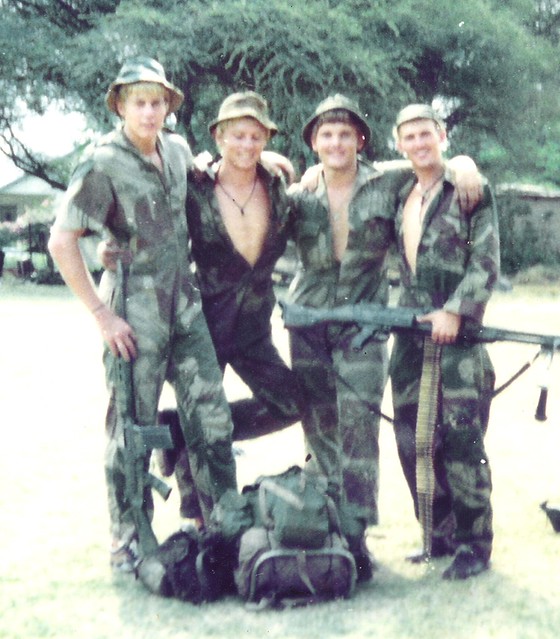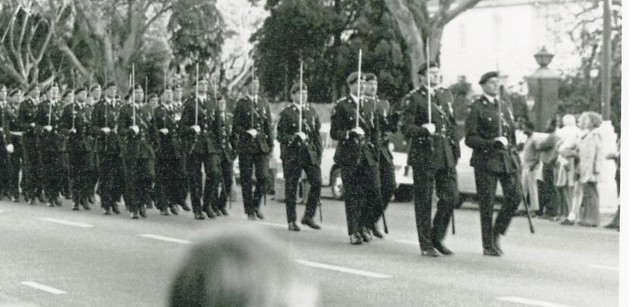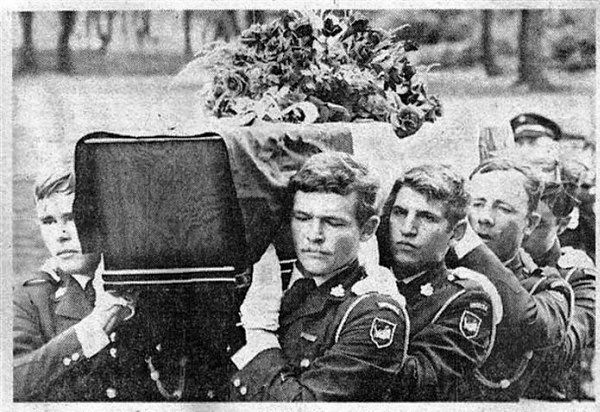... The choppers were warming up and we got aboard. I put on my headphones which stick leaders used to listen in to the K-Car conversation and orders; also to listen to Radio 5 from the good old South Africa. That was a bonus and took your mind off things, plus the pilot chatter would break in on the music so nothing was lost. Well not much anyway. I remember flying into one scene and while I listened to a tune called ‘Some girls will’, the Lynx had dropped a fran (naplam) on a thickly-covered rocky area from which spurted a very fiery gook running like crazy until he dropped. He was forever remembered as ‘Flaming Fury’; and never forgotten actually. It was quite a sight.
Off we went, the K-Car with Major Price in the lead and the rest of the chopper sticks following in a loose formation. I can’t remember the flying time, probably about 15 to 20 minutes but that was my favourite part of the call-out: looking out of the chopper at the other aircraft flying into battle gave me a sense of exhilaration. It’s just a shame Radio 5 never played a James Bond tune just at that time; would have been brilliant. I say I enjoyed flying … well I did and I didn’t. Yes, it was exciting but it was also a bit scary; you see, it wasn’t the people-shooting-at-you bit so much as I am not great with heights … especially heights where you were going to fall a very long way to the ground. I’d spent a year as an MAG gunner hanging out of the side of choppers and didn’t enjoy it at all. Nope, I was quite comfortable as a stick leader listening to the radio, sitting between the helicopter technician / gunner and my MAG gunner. If the chopper banked too steeply they’d fall out first. (To the best of my knowledge this never happened.)
All too quickly the pilot raised his open hand: 5 minutes out. There was (for me) a strange rise and fall of adrenaline with call-outs: when the siren goes you are full of it, but when you are flying into the contact area it seems to go away until you get the fingers; that’s when the nerves and adrenaline really kick in and you can see it on everyone’s face. But the strange thing is; when you get on the ground and you are doing your job: no nerves at all. Weird. And that’s where we were, on the ground, and we started to sweep toward a rocky outcrop. We had started to come across a few suspect hidey-holes which we cleared with grenades along the way.
Trooper Wade however had a case of bad time-keeping and nearly blew my head off. One of the small caves had holes front and back but we could not see inside. To be sure, I put Wade at one end and told him on my command to count to 3 and chuck the grenade in, while I would do the same from my end. My grenade went in and bang. I waited a good two seconds and presumed they’d gone off exactly together. No. They hadn’t. I looked inside the cave to have a shufti and bang! The best laid plans … I think Wade is still on guard duty in Mtoko.
We approached quite a large outcrop and this is where the gooks had holed up. Theo Nel’s stick had got there first and we had a quick chat about what to do next. Best thing to do sometimes is get some civvies in to talk to the gooks; the gooks never actually take any heed of the advice to come out but you often get an idea of where they are in the cave when they first shout at the civvy and then, secondly, shoot him. So two were duly sprung from a nearby kraal, sent into the cave, got shouted at and then shot.
“Anyone know what the population of that kraal was?” But, we had a vague idea of where the gooks were and I told Theo I was going to put a bunker bomb in.
“No, I’ll do it” he said.
“Hey! My idea!”
“Okay, we’ll both do it then.”
Oh, diplomacy. Don’t you just love it! Our position was above and facing the cave entrance and although we were directly in front of the cave we were reasonably safe as anyone attempting to break for it or try and give us a ‘rev’ would be seen well before anything could happen and instantly cut down. We went slowly and silently to the cave entrance. I threw my hefty bunker bomb in first, then Theo threw his and we quickly took cover to the side of the cave mouth. Two powerful explosions went off one after the other and we waited a few seconds. But before we could go inside and check the damage an RPD started chattering again so we decided to wait and think about coming up with a plan B.
This was obviously an established hideout for the gooks; we had found anti-aircraft DIY kits consisting of three stick grenades with the pull-rings attached to nails laid over a small amount of plastic explosive. The theory being that if the explosive detonated the stick grenades would be blasted into the sky, detonating in the air. I wasn’t going to experiment as it all looked highly unsafe. We needed to cover all escape routes from the cave and I took my stick to the top of the outcrop where there was a long narrow opening about a metre wide. It was from this opening that the gooks were giving it stick with the RPD as the K-Car circled pretty low overhead. I called up the K-Car and told him that they were being revved. Major Price replied curtly: “I bloody well know we are!” I left it at that.
We had thoughts of crawling up to the top cave opening and dropping grenades but there was quite a good RPD gunner in there and we didn’t know what was between our position and the opening. But, a few minutes later, for want of no other plan or strategy I decided to crawl over and dropped an M-962 in the crack. The grenade got lodged in rocks before it could drop to the cave floor and the RPD gunner took offence. Close thing! All this went on for some time and the afternoon was changing rapidly to evening; it was time to go home for as sure as eggs are eggs there’d be another call-out at first light and we couldn’t be tied up here. Not to mention the fact that we were completely knackered by now.
Two 1 Commando sticks plus a stick led by Paul Abbott, a very experienced ex-3 Commando ouen, arrived to take over. Paul had been the 14 Troop Sergeant before leaving us and was a good friend of mine. The 1 Commando sticks had been out on deployment operating with the Strike Force contingent which must have been nearby. For most of my army life, whatever was going on was a mystery and I hardly ever knew what the story was really. I sometimes wondered who did.
Rex Harding, one of the other stick leaders from 1 Commando, greeted me outside the cave with: “Budgie, if you laugh I’m going to hit you.” I knew Rex from our Troopie-to-Corporal course back in late ’78. I wasn’t going to laugh at all as the poor buggers must have been really pissed off after getting pulled in off a deployment where they’d probably been walking for miles … just to look after our scene. Paul Abbott joined us and asked for a sitrep.
“So the gooks are in there and that is the cave entrance?”
“Yep.”
“So why are we standing in front of it?”
“Good question.”
I explained that due to the nature of the cave the gooks were around a corner in the cave, couldn’t see us and vice versa. Plus there were three openings: the immediate one to our front, the crack above and to the right of us, plus another farther down below the outcrop which another stick had been dealing with. I suggested that the best ambush pozzy was probably a little back from where we stood and left them to it. Totsiens.
And off we went to steak, beer and bed. It wasn’t a bad war, really. ...



















Bookmarks